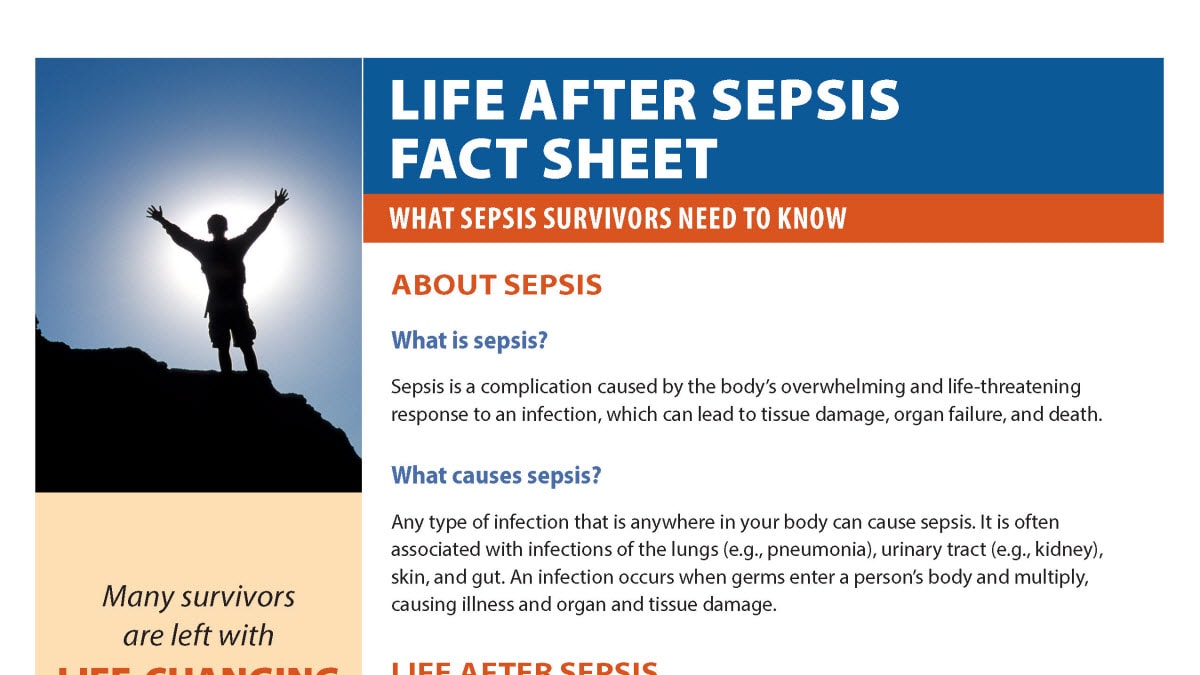Key points
- You have been seriously ill, and your body and mind need time to get better.
- Work with a healthcare provider to determine the most appropriate rehabilitation plan and what activities are safe for you.
What are the first steps in recovery?
After you have had sepsis, rehabilitation usually starts in the hospital by slowly helping you to move around and look after yourself: sitting up, standing, walking, taking yourself to the restroom, bathing and other activities. The purpose of rehabilitation is to restore you back to your previous level of health or as close to it as possible. Work with a healthcare provider to determine the most appropriate rehabilitation plan and what activities are safe for you. Begin your rehabilitation by building up your activities slowly and rest when you are tired.
How will I feel when I get home?
You have been seriously ill, and your body and mind need time to get better.
You may experience the following physical symptoms upon returning home:
- Breathlessness
- Brittle nails
- Difficulty moving around
- Difficulty sleeping
- Dry and itchy skin that may peel
- General body pains or aches
- General to extreme weakness and fatigue
- Hair loss
- Weight loss, lack of appetite, food not tasting normal
You might also experience the following feelings once you're at home:
- Confusing reality (e.g., not sure what is real and what isn't)
- Depressed, angry, unmotivated
- Feeling anxious, more worried than usual
- Flashbacks, bad memories
- Frustration at not being able to do everyday tasks
- Not caring about your appearance
- Poor concentration
- Unsure of yourself
- Wanting to be alone, avoiding friends and family
Talk with a healthcare provider if you or your caregivers are concerned about any physical symptoms or feelings you are experiencing.
What can I do to help myself recover at home?
Work with a healthcare provider to determine the most appropriate rehabilitation plan and what activities are safe for you. Some examples may include:
- Ask your family to fill in any gaps you may have in your memory about what happened to you
- Eat a balanced diet
- Exercise if you feel up to it
- Learn about sepsis to understand what happened
- Make a list of questions to ask a healthcare provider when you go for a check up
- Record your thoughts, struggles and milestones in a journal
- Rest and rebuild your strength
- Set small, achievable goals for yourself each week, such as taking a bath, dressing yourself or walking up the stairs
- Talk about what you are feeling to family and friends
Are there any long-term effects of sepsis?
Many people who survive sepsis recover completely and their lives return to normal. However, as with some other illnesses requiring intensive medical care, some patients have long-term effects. These problems can include the following, some of which may not become apparent until after your hospital stay and may include such consequences as:
- Amputations (loss of limb(s))
- Decreased mental (cognitive) functioning
- Difficulty getting to or staying asleep
- Disabling muscle and joint pains
- Kidney failure, respiratory problems, etc.
- Loss of self-esteem and self-belief
- Nightmares or panic attacks
Talk with a healthcare provider if you have concerns about what you might experience in the weeks and months after getting home from the hospital and to determine the most appropriate rehabilitation plan and what activities are safe for you.
Do the effects of sepsis get better?
Generally, the effects of sepsis do improve with time. Some hospitals have follow-up clinics or staff to help patients, once they have been discharged from the hospital, and their families or caregivers. Find out if yours does or if there are local resources available to help you while you get better. However, if you feel that you are not getting better, finding it difficult to cope, are continuing to be exhausted or want more information, call a healthcare professional.
Am I at risk for sepsis again? What should I do if I think I have sepsis again?
Sepsis survivors are at higher risk for getting sepsis again. If you or your loved one has an infection that’s not getting better or is getting worse, act fast. Get medical care immediately. Ask a healthcare professional, “Could this infection be leading to sepsis?” and if you should go to the emergency room. With fast recognition and treatment, most people survive.

